
University of Queensland researchers have identified key approaches for addressing ecological grief – a psychological response to environmental loss or degradation.
The team emphasised the urgent need to support those most acutely facing this phenomenon: environmental professionals.
Honorary Fellow Anna Cooke, from UQ’s School of the Environment, said environmental professionals – such as environmental scientists, engineers or policymakers – are often the first to suffer from ecological grief.
“These professionals are often watching the species and environments they have studied and worked to protect - for years or even decades - become damaged to the point of extinctions,” Ms Cooke said.
“While ecological grief is a relatively new concept, our cross-disciplinary team drew on public health approaches to grief and bereavement support that have strong evidence.
“We found that social support is a crucial factor in adapting to any loss, which for environmental professionals, is likely to come from colleagues and peers who share experience working with nature.
“That’s why we are advocating for promoting ecological grief literacy at all levels of organisations where environmental professionals work.
“It’s vital for these approaches to encompass knowledge, skills and values that help professionals support each other and themselves in this experience, to mitigate the risks to mental health.”
Dr Julie Dean from UQ’s Institute for Social Science Research is a co-author on the paper and was involved in a workshop held for ecologists experiencing grief that helped kickstart this conversation.
“The workshop included small group discussions, sharing of information about the neuroscience of stress and emotion, breathing and meditation exercises, and other activities so that participants could take what was useful for them,” Dr Dean said.
“But it was also important for people to understand there is no universally ‘best’ or ‘right’ way to respond to loss – what proves helpful for one person may not be effective for another.”
“Approaches vary from person to person, where some go for a run in the bush with a friend, or participate in one of Psychology for a Safe Climate’s Climate Cafes — where individuals can openly discuss their experiences— others take a break from news and social media, and many other options.”
Co-author on the paper, UQ’s Dr Claudia Benham, said that workplace supports are essential for tackling this problem.
“Our workplace health and safety laws have rightly focused on mitigating and eliminating psychosocial risks in recent years, and it’s essential that ecological grief is recognised and addressed,” she said.
“While peers have the potential to provide interpersonal support and connection for ecological grieving, it’s essential that organisations act too.
“All organisations who have employees facing ecological grief need to enact policies and practices that provide structures, resources, and contexts to enable these workers to effectively support ourselves and each other.
“It is key for environmental professionals to have the opportunity to experience helpful support in their workplace and have access to information and options that suit them.”
“We have the capacity to work together and overcome this crisis – let’s protect our mental health while protecting what we can, and collectively come together to build a brighter future.”
The research was published in Conservation Letters.
Media: Ms Anna Cooke, a.cooke2@uq.edu.au, +61 438 662 768; Dr Claudia Benham, c.benham@uq.edu.au, +61 403 789 105; Faculty of Science Media, science.media@uq.edu.au, +61 438 162 687.



